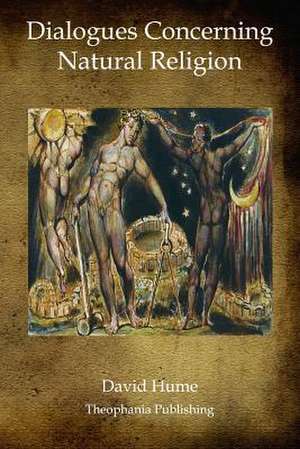Dialogues Concerning Natural Religion
Autor David Humeen Limba Engleză Paperback
| Toate formatele și edițiile | Preț | Express |
|---|---|---|
| Paperback (22) | 40.66 lei 3-5 săpt. | |
| CREATESPACE – | 40.66 lei 3-5 săpt. | |
| CREATESPACE – | 66.23 lei 3-5 săpt. | |
| Penguin Books – 21 feb 1990 | 67.20 lei 3-5 săpt. | +18.79 lei 6-12 zile |
| CREATESPACE – | 70.56 lei 3-5 săpt. | |
| CREATESPACE – 31 mar 2010 | 71.11 lei 3-5 săpt. | |
| Hackett Publishing Company – 14 mar 1998 | 72.51 lei 3-5 săpt. | +11.82 lei 6-12 zile |
| – | 76.63 lei 3-5 săpt. | |
| CREATESPACE – | 82.97 lei 3-5 săpt. | |
| CREATESPACE – | 93.89 lei 3-5 săpt. | |
| Digireads.com – 11 iun 2019 | 51.87 lei 6-8 săpt. | |
| CREATESPACE – | 53.84 lei 6-8 săpt. | |
| Merchant Books – 21 iun 2009 | 54.73 lei 6-8 săpt. | |
| – | 61.15 lei 6-8 săpt. | |
| A & D Publishing – 29 oct 2008 | 61.40 lei 6-8 săpt. | |
| Lulu.Com – 13 sep 2017 | 71.04 lei 6-8 săpt. | |
| Alpha Editions – 31 ian 2018 | 75.83 lei 6-8 săpt. | |
| Indoeuropeanpublishing.com – 30 iun 2010 | 76.50 lei 6-8 săpt. | |
| Bibliotech Press – 9 feb 2014 | 83.50 lei 6-8 săpt. | |
| Bibliotech Press – 13 iul 2019 | 83.50 lei 6-8 săpt. | |
| Book Jungle – 11 oct 2007 | 90.62 lei 6-8 săpt. | |
| Theophania Publishing – | 110.45 lei 6-8 săpt. | |
| HardPress Publishing – 27 ian 2013 | 114.57 lei 39-44 zile | |
| Hardback (5) | 117.38 lei 6-8 săpt. | |
| A & D Publishing – 2 apr 2018 | 117.38 lei 6-8 săpt. | |
| Suzeteo Enterprises – 26 oct 2018 | 121.32 lei 6-8 săpt. | |
| Lulu.Com – 13 sep 2017 | 160.05 lei 6-8 săpt. | |
| Binker North – 20 oct 2019 | 174.66 lei 39-44 zile | |
| Bibliotech Press – 13 iul 2019 | 181.67 lei 6-8 săpt. |
Preț: 110.45 lei
Nou
Puncte Express: 166
Preț estimativ în valută:
21.13€ • 23.03$ • 17.81£
21.13€ • 23.03$ • 17.81£
Carte tipărită la comandă
Livrare economică 24 aprilie-08 mai
Preluare comenzi: 021 569.72.76
Specificații
ISBN-13: 9781770833784
ISBN-10: 1770833781
Pagini: 130
Dimensiuni: 152 x 229 x 7 mm
Greutate: 0.18 kg
Editura: Theophania Publishing
ISBN-10: 1770833781
Pagini: 130
Dimensiuni: 152 x 229 x 7 mm
Greutate: 0.18 kg
Editura: Theophania Publishing
Notă biografică
David Hume (/hjüm/; born David Home; 7 May 1711 NS (26 April 1711 OS) - 25 August 1776)[9] was a Scottish Enlightenment philosopher, historian, economist, and essayist, who is best known today for his highly influential system of philosophical empiricism, scepticism, and naturalism.[1] Beginning with A Treatise of Human Nature (1739-40), Hume strove to create a naturalistic science of man that examined the psychological basis of human nature. Hume argued against the existence of innate ideas, positing that all human knowledge derives solely from experience. This places him with Francis Bacon, Thomas Hobbes, John Locke, and George Berkeley, as a British Empiricist.[10] Hume argued that inductive reasoning and belief in causality cannot be justified rationally; instead, they result from custom and mental habit. We never actually perceive that one event causes another, but only experience the "constant conjunction" of events. This problem of induction means that to draw any causal inferences from past experience it is necessary to presuppose that the future will resemble the past, a presupposition which cannot itself be grounded in prior experience.[11] An opponent of philosophical rationalists, Hume held that passions rather than reason govern human behaviour, famously proclaiming that "Reason is, and ought only to be the slave of the passions".[10] Hume was also a sentimentalist who held that ethics are based on emotion or sentiment rather than abstract moral principle. He maintained an early commitment to naturalistic explanations of moral phenomena, and is usually taken to have first clearly expounded the is-ought problem, or the idea that a statement of fact alone can never give rise to a normative conclusion of what ought to be done.[12] Hume also denied that humans have an actual conception of the self, positing that we experience only a bundle of sensations, and that the self is nothing more than this bundle of causally-connected perceptions. Hume's compatibilist theory of free will takes causal determinism as fully compatible with human freedom.[13] His views on philosophy of religion, including his rejection of miracles and the argument from design for God's existence, were especially controversial for their time. Hume influenced utilitarianism, logical positivism, the philosophy of science, early analytic philosophy, cognitive science, theology, and many other fields and thinkers. Immanuel Kant credited Hume as the inspiration who had awakened him from his "dogmatic slumbers".
Cuprins
Descriere
Descriere de la o altă ediție sau format:
Presents traditional arguments for the existence of God, expressing the belief that religion is founded on ignorance and irrational fears. This book offers a case against orthodox Christian theological thinking and the 'deism' of the time, which pointed to the wonders of creation as conclusive evidence of God's Design.
Presents traditional arguments for the existence of God, expressing the belief that religion is founded on ignorance and irrational fears. This book offers a case against orthodox Christian theological thinking and the 'deism' of the time, which pointed to the wonders of creation as conclusive evidence of God's Design.
